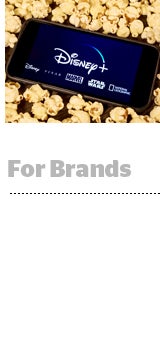Brands aren’t totally boxed out of a relationship with ad-free Disney Plus.
The streaming service, which has been running co-marketing deals with brands like Verizon since its launch in November 2019, is open to similar deals as well as product placement and brand integrations in its original shows, sources tell AdExchanger.
A Disney Plus spokesperson said it does not offer any branded content opportunities.
So far, Disney Plus has been most public about its co-marketing opportunities, said Matt Sweeney, chief investment officer at GroupM. These types of deals are becoming more popular as subscription services flood the market.
In addition to its partnership with Verizon, where subscribers to the telco’s unlimited wireless plan get a year of Disney Plus for free, buyers of LG OLED TVs and Google Chromebooks can also redeem free trial offers for Disney Plus.
In December, Disney announced Delta as the exclusive airline to carry a selection of titles from the Disney Plus library. And just last week, Disney launched a promotion with Kellogg’s, where breakfast cereal buyers get a free two-week trial of the service.
“There’s a long history of those cross-promotions,” said Mike Bloxham, SVP of global entertainment and media at Magid. “Disney now has a streaming platform that can be tied into this discussion.”
For now, Disney Plus is mostly brokering these deals with brands directly. But at CES, the streaming service met with senior agency executives to brainstorm ideas for potential ways to work together beyond a pure ad buy, people at the meeting said. No specific deal was brokered at the event.
Co-marketing is a tried and true tactic that would allow Disney Plus to capitalize on brand dollars while remaining ad-free. Brands are eager to get in front of viewers on premium content and be associated with the brand equity of Disney Plus, said Eric Schmitt, analyst at Gartner.
“There are a lot of reasons why advertisers will be motivated to work with Disney on any terms they can, even if those terms don’t have a lot to do with 15s and 30s,” he said.
Brands are hopeful that co-marketing deals could lead to branded content opportunities on Disney Plus originals, similar to the way brands are integrated into Netflix and Amazon Prime shows. Agency sources tell AdExchanger that Disney is planning to share a list of shows and discuss brand integration opportunities once it finalizes its slate of originals.
But Disney is likely going to be selective about which brands it lets onto Disney Plus. Unlike Netflix, which is heavily ramping up its brand integrations, Disney has multiple revenue streams to cover the costs of SVOD content.
“Disney has always been pretty selective with its particular equity,” Bloxham said. “Disney Plus has the name front and center, so they will quite naturally be sensitive to that.”
If co-marketing deals and brand integrations become the new reality for marketers as consumers engage less with advertising on TV, they’ll have to rethink the way they measure the effectiveness of such opportunities, said Brad Stockton, VP of video innovation at Dentsu Aegis Network.
“For us to know the value, we have to see how many people have the opportunity to see the ad and how many people did see it,” he said. “We’re not getting program-level details.”












